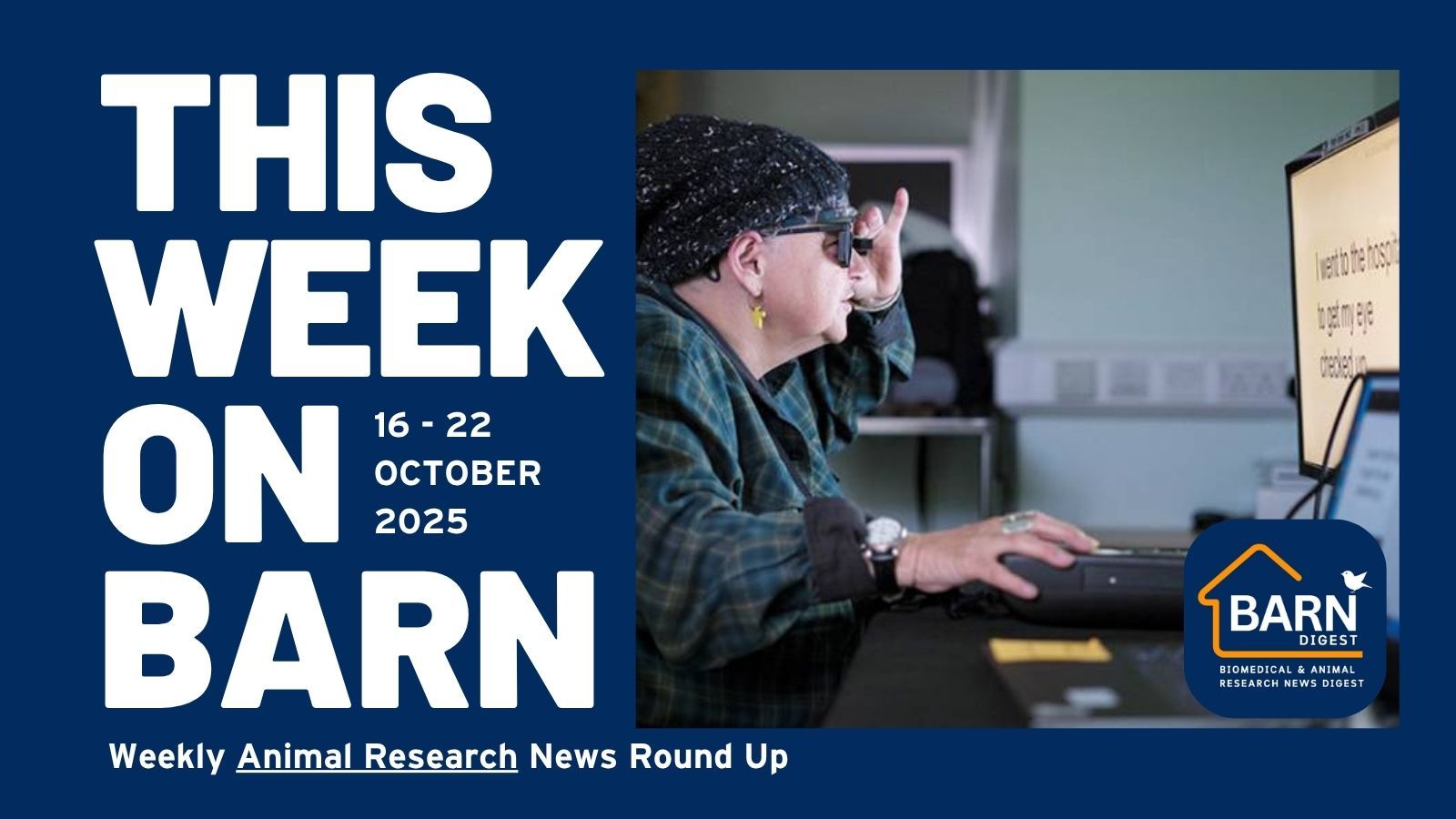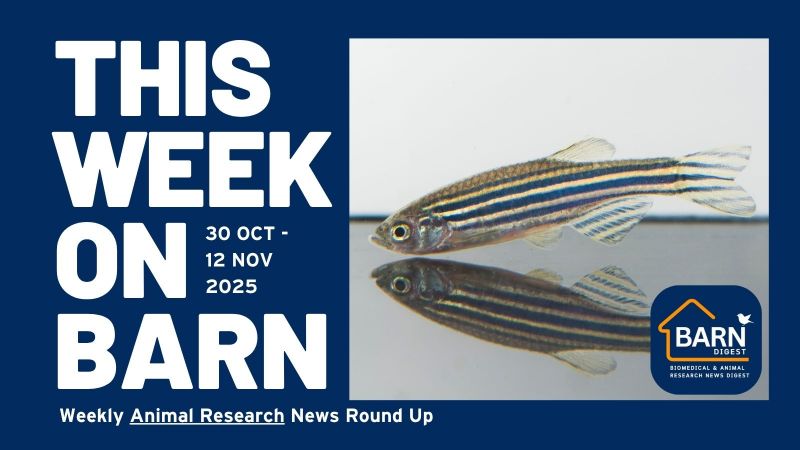
The Biomedical Animal Research News (BARN) Digest collates animal research news from UAR’s 150+ member organisations into one, easy to access, feed. These animal research related stories include topics such as: medical studies and advancements; animal welfare and 3Rs news; funding, regulatory, and policy news; and conservation and environmental research that involves animal testing.
Each week, we pick the most interesting, groundbreaking, and important news to feature in a weekly news roundup. In this round up we feature news stories from 16-22 October 2025.
View BARN to see daily news updates from UAR members.
CLINICAL TRIALS/HUMAN MEDICINES
Pioneering eye device restores reading vision to blind eyes
UCL | HUMAN CLINICAL TRIALS
The electronic eye implant was developed in pigs before moving to human clinical trials.
"After being treated with an electronic eye implant paired with augmented-reality glasses, people with sight loss have recovered reading vision, reports a trial involving a UCL and Moorfields clinical researcher.
The results of the European clinical trial, published in The New England Journal of Medicine, showed 84% of participants were able to read letters, numbers and words using prosthetic vision through an eye that had previously lost its sight due to the untreatable progressive eye condition, geographic atrophy with dry age-related macular degeneration (AMD).
This revolutionary new implant is the first ever device to enable people to read letters, numbers and words through an eye that had lost its sight."
https://www.ucl.ac.uk/news/2025/oct/pioneering-eye-device-restores-reading-vision-blind-eyes
https://www.bbc.co.uk/news/articles/c0qpz39jpj7o
Photo above: Study participant Sheila Irvine training with the device. Credit: Moorfields Eye Hospital
Landmark gene therapy study shows safety for children
UCL | HUMAN CLINICAL TRIALS
Gene therapies, including therapies for Severe combined immunodeficiency (SCID) due to adenosine deaminase (ADA) deficiency (ADA-SCID)were developed in a variety of animal species.
"An international team of researchers led by Great Ormond Street Hospital (GOSH), University College London (UCL), and University of California, Los Angles (UCLA) developed a gene therapy for children with the rare immune condition, known as ADA-SCID. They then followed the children’s recovery and progression for an average of 7.5 years. Those treated had a 100% survival rate and over 95% of children were cured of their condition.
Published in the New England Journal of Medicine, this study represents the largest cohort of data of children who have received the most standard type of gene therapy, known as lentiviral gene therapy, to date."
https://www.ucl.ac.uk/news/2025/oct/landmark-gene-therapy-study-shows-safety-children
Addenbrooke’s begins innovative liver cancer treatment for first patients in Europe
UNIVERSITY OF CAMBRIDGE | AVAILABLE TREATMENT
Histotripsy was developed for use in liver cancer treatment using mice and rats before moving to human clinical trials. The treatment has passed clinical trials and is now available to NHS patients.
"A Cambridge patient has become the first person in Europe to receive cutting-edge histotripsy treatment outside of a clinical trial, after the technology was fast-tracked by the Government - marking a major milestone in NHS cancer care.
Histotripsy uses focused sound waves to generate microscopic “bubble clouds” from naturally occurring gases present in targeted tumour tissues. The bubbles form and collapse in microseconds, creating mechanical forces that destroy cancer cells without the need for surgery, radiation, or chemotherapy. With treatment taking as little as 30 minutes and usually with minimal or no pain, patients can recover quickly and spend less time in hospital, with treatment performed as a day case."
BASIC/DISCOVERY RESEARCH
Research shows genetically engineered human cells can repair myelin in mice
MS SOCIETY | MICE
"In this study, researchers grew human oligodendrocyte precursor cells (OPCs) in the lab. These are a type of cell found in the brain that normally transform into myelin-making cells called oligodendrocytes. But signals in the environment of MS lesions stop this from happening.
Professor Anna Williams and her team used a technique called CRISPR to edit a small section of the DNA of these OPCs to make them ignore anti-repair signals. And found that when these cells were transplanted into mouse brains, they were able to improve myelin repair.
Dr Laura Wagstaff, a postdoctoral researcher at the University of Edinburgh who worked on the study, says:
“Our work is a proof of concept. The next step is to see if we can remove the need for transplants and edit the cells directly in humans. This is an approach similar to gene therapy which may be an effective method of promoting remyelination in the future.” "
WILDLIFE
Scientists crack the genetic code behind nature’s greatest transformation of The Very Hungry Caterpillar
UNIVERSITY OF BRIGHTON | CATERPILLARS
"In a pioneering study, scientists at the University of Brighton have mapped the specific genes that are turned on and off and the chemical modification of the caterpillar across every stage of its life cycle, from larva to a mature adult – revealing how it effectively rewrites its own biological blueprint to become a butterfly."
ENVIRONMENT
Excess fine sediment in rivers starves fish habitats of oxygen
ROTHAMSTED RESEARCH | FISH
"A build-up of ultra-fine sediment in riverbeds is creating oxygen-starved conditions that threaten fish spawning grounds and freshwater invertebrates, new research on the River Taw in Devon has revealed.
A team of Rothamsted scientists found that the smallest sediment particles trapped in riverbed gravel can exert a disproportionally high “oxygen demand” as organic material within them decomposes, depriving eggs and larvae of vital oxygen. The problem appeared to be most acutely related to the very smallest particles in the <25μm fraction of sediment — fine material that settles into riverbed pores and is difficult to flush out."
https://www.rothamsted.ac.uk/news/excess-fine-sediment-rivers-starves-fish-habitats-oxygen
REPLACING AND REDUCING ANIMALS IN RESEARCH
Scientists secures over half a million pounds to improve medical research while reducing animal use
UNIVERSITY OF PORTSMOUTH | REDUCING ANIMAL USE
"University of Portsmouth researchers have been awarded a £654,625 grant from UK Research and Innovation (UKRI) to tackle a problem that could transform how medical research is conducted, while significantly reducing the number of laboratory animals needed.
The three-year study, led by scientists at the European Xenopus Resource Centre (EXRC), will examine why African clawed frogs - essential contributors to medical breakthroughs for over 60 years - are experiencing declining productivity in research facilities. By solving this problem, scientists hope to dramatically reduce animal numbers used while accelerating life-saving research."
Investing in infrastructure for animal replacement methods
NC3R'S | REPLACING ANIMALS
"In 2024, the NC3Rs received additional funding from the Department for Science, Innovation and Technology (DSIT). The funding provided a significant opportunity to address a key barrier to uptake of animal replacement methods – the limited access to infrastructure and specialist resources.
Eleven awards totalling £3.95M were made through a competitive call. The funding enabled national facilities to be established for stem cells, bioprinting, organoids and organ-on-a-chip systems, providing greater access to these technologies as well as training opportunities for researchers across the UK. Since the awards were made in September 2024 more than 1,800 researchers have benefited from the facilities and over 120 academic and industry partnerships are helping to embed the technologies into research practice. Together, these awards are replacing the use of thousands of animals annually and creating sustainable infrastructure to support the continued adoption of non-animal methods across the UK. "
https://nc3rs.org.uk/news/investing-infrastructure-animal-replacement-methods
AWARDS
World-leading Alzheimer’s researcher awarded CBE
UCL | ALZHEIMER'S RESEARCH
Professor Bart De Strooper's research often involves work in mouse models of Alzheimer's.
"Professor Bart De Strooper (UK Dementia Research Institute at UCL) has been awarded an honorary CBE for his services to dementia research in the UK and internationally.
Professor De Strooper is best known for his work on the role of the presenilin and gamma-secretase proteins in the proteolytic processing of the amyloid precursor protein (APP). When processed abnormally, APP produces toxic amyloid beta, which accumulates in the brain to form plaques, one of the hallmarks of Alzheimer’s.
More recently, he has worked on a cellular theory for Alzheimer’s to explain how different cell types, and their underlying genetics and behaviour, contribute to the progressive disease process.
He has now been recognised by the Foreign and Commonwealth Office as part of the honorary awards to foreign nationals 2025."
https://www.ucl.ac.uk/news/2025/oct/world-leading-alzheimers-researcher-awarded-cbe
Visit BARN for daily news updates
Last edited: 28 October 2025 15:23




